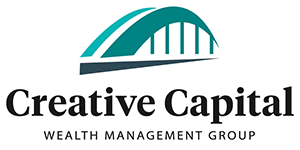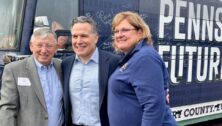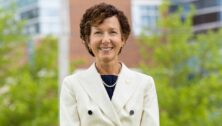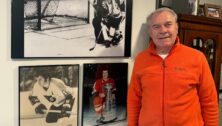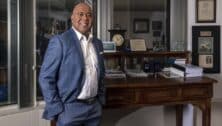Philadelphia Leadership: Derek Dobin, Managing Director, Creative Capital Wealth Management Group
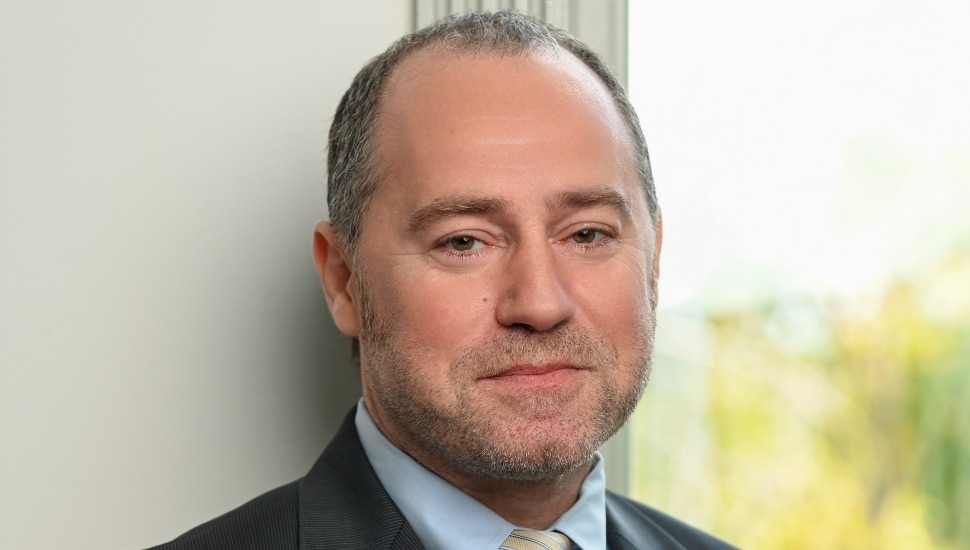
Derek Dobin, Managing Director at Creative Capital Wealth Management Group in Phoenixville, spoke with PHILADELPHIA Today about moving around the Midwest as a child due to his dad’s job, learning handyman work from his mom, and the moment in high school he realized he wanted to work harder so he could go to college.
Dobin discussed why he studied engineering in college, his career in fiber optics with Kyocera, and why he switched to working in financial services. He talked about Creative Capital’s innovative approach to financial planning and reflected on the advice from a mentor that he still takes to heart.
Where were you born and where did you grow up?
I was born in Springfield, Ill., and grew up mostly in Connecticut. We moved around a lot in the Midwest. My dad was an IBM-er. Back in the day, they joked that IBM meant “I’ve been moved.”
What did your mom do?
My mom was a self-taught computer programmer. She grew up on a farm in Springfield, Ill., and she was the oldest of three. College was not an option for her. She had to stay around, help with her younger brother and sister, help with the farm, and then she taught herself computer programming by reading books on C++ language.
What did your dad do for IBM?
He was marketing and strategic relationships. My mom worked for the government in the state of Illinois doing computer programming, and then they bounced around. We went to Wisconsin, Minnesota, back to Wisconsin, and then we ended up in Connecticut, where he was Senior Management in strategic relationships.
How did you do with all that bouncing around?
It was easy for me. I was so young. There wasn’t the internet, so we had to go outside and find kids to play with.
Where were you in the pecking order, Derek?
My sister is almost six years older. Once she got to high school in Connecticut, my parents had a chance to take an opportunity in Japan. My sister said, “No way.” Apparently, she was serious enough that they realized they couldn’t do it.
What do you remember about growing up in Connecticut or any of the other places you lived?
I remember when we were in Wisconsin and Minnesota, my dad was managing the relationships with the Universities of Wisconsin and Minnesota. We lived right next to the campuses. We would go to every sporting event — every football game, every basketball game. I loved Wisconsin hockey.
When we moved to Connecticut, it was more stable. I had long-term friendships and played sports for years with the same guys and went to high school there and then off to college.
What sports did you play, Derek?
I mainly played soccer and basketball. Soccer was the one I was best at, and I still play to this day.
Did you play in college?
No, I went to a big school and studied engineering, so there was no time.
Do you have a favorite moment that you remember on the soccer field?
We won a couple of state championships. Those were great. I also remember we lost one in a snowstorm that I’ll never forget. We lost one in penalty kicks that I’ll never forget either.
Did you have any part-time jobs in high school?
I did painting and handyman work in the summers. My mom was super handy, so she taught me all that stuff. We remodeled our basement in Connecticut, and I helped her. Then I went off and did that stuff during the summers.
What lessons did you take from those summer jobs that still influence how you work today?
I learned that there is freedom in having your own money and earning it — not just an allowance or something like that. if I wanted something, I had to go work for it and make my own money.
What kind of music were you listening to growing up?
My dad was a classic rock guy. He had an amazing album collection of Eric Clapton and The Beatles and everybody from that generation. Bob Dylan, The Who — that was what I grew up with. That’s what stuck with me through my high school years until I had exposure to college roommates and all the different kinds of music out there.
Did you have a favorite artist?
It was probably Eric Clapton growing up. I was never a huge music guy, honestly, so music was never a driving force for me.
What was a driving force back then in your life?
Maybe it comes from my mom — the hard work. I was a mediocre high school student for the first two years and just decided that I was going to take it seriously from there. I worked my butt off junior and senior years, and I worked to make as much money as I could in the summers.
My parents never forced the issue. They certainly weren’t happy with mediocrity, but they were maybe a little too relaxed about it. It clicked one day that if I wanted to go to college, I had to get my act together.
Where did you end up going to college, and why?
I went to Rutgers in New Brunswick. My uncle and grandfather went to Rutgers. I got into a couple of other schools — in particular, UC Berkeley. It was very expensive. I couldn’t square the cost when I could get the same education at Rutgers.
Somewhere along the way, I had the conversation that undergrad is the same pretty much everywhere. So, the advice was to focus on getting great grades in undergrad, and if you want to go to grad school, that’s where you start to get picky and spend more money.
Looking back, was Rutgers a good choice for you?
Yeah, I met my wife — now ex-wife — but I met my wife and got a great education.
And you ended up going to graduate school, too?
I did. One of my professors convinced me to stay at Rutgers. It was free education and a stipend to work in the labs for him and get my doctorate. I ended up leaving with my master’s because we were effectively slave labor for him. We were building the products in the labs. It was an interesting relationship. I couldn’t see the doctorate track at that point and decided it was time to figure something else out.
What engineering branch was it?
Rutgers, at the time, had a very strong relationship with AT&T Bell Labs. They had one of the fathers of fiber optics at Rutgers. Their ceramics program, which encompassed fiber optics, was number one or number two on everybody’s list on the planet. So I said, “I’ve got to do that.” I majored in ceramics and material science, and my specialty was fiber optics and glass.
When you finished your master’s degree, who saw promise in you and opened up doors for you in your career?
A buddy that I worked with in the labs went on to work for a Japanese company, Kyocera, and he convinced me to join their group. They start you hourly, so even with my master’s, I was making maybe $10 to $20 bucks an hour. I worked my butt off to get the full-time role and make good money with those guys. You had to prove it to them.
The company was about hard work, which was a great fit. But this also drove home that you can be the smartest guy, but if you’re not going to put in the work, it doesn’t matter. Hard work can outdo any intelligence level.
Who else saw promise in you early in your career?
The vice president at the time at Kyocera ended up being the president of Kyocera International, which is their North American arm. He saw promise in me, and that was motivating having that type of relationship with him.
What did he see in you, Derek?
The hard work plus the intelligence. He gave me one of the best opportunities of my career. We had lots of offices in California, obviously, but we had operations in Mexico where we did fiber optic production for key clients like Lucent and JDS Unified. The guys in the California office did not want to manage the production team in Mexico. He gave me that opportunity.
It was such a great experience. I lived in San Diego two weeks out of the month. I drove back and forth to Tijuana and worked closely with the team in Mexico. It was a phenomenal time in the industry where everybody was making so much money and there was a reward for all the hard work. It came to an end in 2000 or 2001 with the tech bubble bursting. And the travel became a bit of a challenge for me to get married. So, my wife started to have more of an influence at that point.
How old were you when you were managing that factory?
I was 26.
How did you do with that responsibility?
I loved it. I was working with some of the smartest engineers from Lucent Technologies, which was AT&T Bell Labs. I couldn’t soak up enough of that experience.
How did you make the shift from fiber optics to financial services?
My ex-wife is a doctor. We were starting to amass assets as a family, and my travel with her being a full-time doctor and having little kids was untenable. Then, the tech bubble burst in 2001. That was a miserable experience for our space. Everybody moved everything to China as fast as they could, unfortunately, to make it affordable.
I tried several other jobs but could never escape all the travel. Then we added our third kid, and it was too much stress for my ex-wife. And as an anesthesiologist, she was going to make so much more money than I was. We decided to shift to where I could be at home and manage the kids and manage the babysitter and she didn’t have to worry about anything.
Why financial services?
Because we were amassing assets as a family, and I was trying to figure this stuff out at 2:00 AM for my family anyway, you know? I said, “Worst-case scenario, I figure out what to do for us and it’ll help us save a lot more money and add value for us as a family. If I can’t make it as a sales guy in financial services, okay, we learned enough for our family.”
Looking back, was it a good decision for you?
It was. I love this stuff, but it wasn’t the full answer, unfortunately, for my marriage. That’s my biggest regret. But the analytical side of it is phenomenal. The project management aspect is a phenomenal fit as well. You have to be a people person in this business, and you have to be able to listen. So, it worked out well for me.
I started at Prudential because they had great training. A family friend said, “Start there, figure out what you want to do. There are so many different aspects of financial services, and you can go in a million directions. Prudential will give you a snapshot of almost every direction, and in a year or two, you can figure out whether you want to stay there or move on.”
It was about that two-year mark and my marriage was falling apart, and I was going to leave Prudential because I liked the investment side of it more than the insurance side. The senior manager of training and development at Prudential came to me and said, “I’m retiring in a year, and I think this job’s perfect for you.” I couldn’t resist that opportunity. It’s a sweetheart job. You’re the good guy in the office for the whole region, and you’re rewarded for it financially as well.
How long did you do that for?
I did that until Prudential decided to get rid of the in-house training. They squeezed it down to a call center and kept a handful of people with 30-plus years of experience.
How did you end up at Creative Capital?
I had already developed great relationships with advisers all over New Jersey and Pennsylvania. I was going to develop more professional relationships with them and move on from Prudential. I would have done fine on that path, but they announced the role ending in 2019 and gave me until February 2020 to exit. Two weeks later was COVID and the shutdown.
All the senior advisors that I was working with froze. It was an odd time. I tried to make those relationships work for a year or two. After that, I was looking for better opportunities, and Fred Hubler from Creative Capital reached out.
What drew you into Creative Capital?
The opportunity here is amazing. Fred has been working on a recipe that was not very interesting to a lot of people for a long time. He stuck with it, and it became two critically important facets of financial services today. It’s probably got five to 10 years before it really spreads out, but you can see the early seeds of it right now.
It’s been amazing to learn a whole area of financial services that I barely touched upon, and Fred’s understanding of where financial planning is going for the future is ahead of the curve. It’s such a compelling combination of forces.
We’re in the summer of 2024. What initiatives and priorities do you have in front of you this year?
It’s been a whirlwind. The activity has continued to ramp to the point where I am, today, more of a Senior Wealth Strategist than a Managing Director. We just hired three great people in the last two months. The goal now is to build out scalable models so we can scale this thing. The sky’s the limit on the activity and the amount of people that we can help in our reach across the country. We just need the resources and the systems in place to do it efficiently. That’s my focus now: putting those systems in place and continuing this growth.
Three final questions, Derek. What’s something big that you’ve changed your mind about over the last five to 10 years?
I didn’t embrace religion as a child. I do now. That’s something that became more and more important as I lost my mom last year. I appreciate religion more and more now.
How do you stay hopeful and optimistic? It’s a crazy world.
I feel incredibly lucky to be born into the greatest country on the planet, to be born into a good family, and to have good parents. I try to remind my kids every day how lucky they are when they feel like something’s unfair or something didn’t work out for them. That’s what makes me optimistic; we’re really, really lucky.
Finally, Derek, what’s the best advice you’ve ever received?
It was probably that vice president at Kyocera. I used to work so hard and grind myself about every little thing. He pulled me aside and said, “Don’t sweat the small stuff. Keep the end goal in your focus, and there’s going to be the bumps along the road.” He gave me a lot of great advice along the way coming from a grown-up at the time to a kid, so that was one of many.
Connect With Your Community
Subscribe for stories that matter!
"*" indicates required fields


